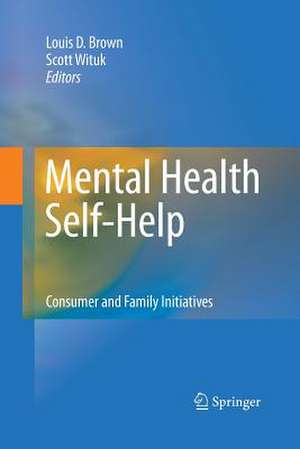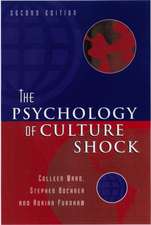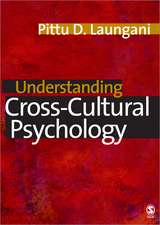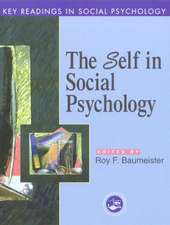Mental Health Self-Help: Consumer and Family Initiatives
Editat de Louis D. Brown, Scott Wituken Limba Engleză Paperback – 19 oct 2014
Mental Health Self-Help assembles the state of the evidence on the effectiveness of MHSH, beginning with the individual and larger social factors behind the expansion of consumer-directed services. Clearly organized and accessibly written, the book traces the development and evolution of MHSH as both alternative and adjunct to traditional mental health structures, offers research-based perspectives on the various forms of MHSH, and identifies potential areas for consumer initiatives to work with—and help improve—mental health systems. Contributors weigh strengths and limitations, raise research and methodology questions, and discuss funding and training issues to give readers a deeper understanding of the field and an informed look at its future impact on mental health treatment. Individual chapters cover the spectrum of contemporary self-help initiatives in mental health, including:
• Online mutual aid groups.
• Consumer-run drop-in centers.
• Family and caregiver groups.
• Certified peer support specialists.
• Consumer advocacy initiatives.
• Technical assistance organizations.
• Professional/self-help collaborations.
Mental Health Self-Help is a bedrock guide to an increasingly influential aspect of the mental health landscape. Researchers studying these initiatives from a variety of fields including community and clinical psychology, and public health—as well as clinicians, counselors, social workers, case managers, and policymakers—will find it an indispensable reference.
| Toate formatele și edițiile | Preț | Express |
|---|---|---|
| Paperback (1) | 644.63 lei 6-8 săpt. | |
| Springer – 19 oct 2014 | 644.63 lei 6-8 săpt. | |
| Hardback (1) | 651.02 lei 6-8 săpt. | |
| Springer – 19 aug 2010 | 651.02 lei 6-8 săpt. |
Preț: 644.63 lei
Preț vechi: 758.38 lei
-15% Nou
Puncte Express: 967
Preț estimativ în valută:
123.36€ • 128.06$ • 102.87£
123.36€ • 128.06$ • 102.87£
Carte tipărită la comandă
Livrare economică 24 martie-07 aprilie
Preluare comenzi: 021 569.72.76
Specificații
ISBN-13: 9781493902460
ISBN-10: 1493902466
Pagini: 384
Ilustrații: XXII, 359 p.
Dimensiuni: 155 x 235 x 20 mm
Greutate: 0.54 kg
Ediția:2010
Editura: Springer
Colecția Springer
Locul publicării:New York, NY, United States
ISBN-10: 1493902466
Pagini: 384
Ilustrații: XXII, 359 p.
Dimensiuni: 155 x 235 x 20 mm
Greutate: 0.54 kg
Ediția:2010
Editura: Springer
Colecția Springer
Locul publicării:New York, NY, United States
Public țintă
ResearchCuprins
to Mental Health Self-Help.- to Mental Health Self-Help.- Frameworks for Research and Practice.- Theoretical Foundations of Mental Health Self-Help.- Participatory Action Research and Evaluation with Mental Health Self-Help Initiatives: A Theoretical Framework.- MHSH groups.- The Contributions of Mutual Help Groups for Mental Health Problems to Psychological Well-Being: A Systematic Review.- Online Self-Help/Mutual Aid Groups in Mental Health Practice.- An Overview of Mutual Support Groups for Family Caregivers of People with Mental Health Problems: Evidence on Process and Outcomes.- Consumer-Delivered Services.- Consumer-Run Drop-In Centers: Current State and Future Directions.- Certified Peer Specialists in the United States Behavioral Health System: An Emerging Workforce.- The Development and Implementation of a Statewide Certified Peer Specialist Program.- MHSH Policy.- Finding and Using Our Voice: How Consumer/Survivor Advocacy is Transforming Mental Health Care.- How Governments and Other Funding Sources Can Facilitate Self-Help Research and Services.- Technical Assistance.- Consumer and Consumer-Supporter National Technical Assistance Centers: Helping the Consumer Movement Grow and Transform Systems.- A Statewide Collaboration to Build the Leadership and Organizational Capacity of Consumer-Run Organizations (CROs).- Self-Help/Professional Collaboration.- Helping Mutual Help: Managing the Risks of Professional Partnerships.- The Contribution of Self-Help Groups to the Mental Health/Substance Use Services System.
Notă biografică
Louis D. Brown is a community psychologist and research faculty member of The Pennsylvania State University. His research examines how people engage in and benefit from self-help/mutual support initiatives. As a Research Associate at the Penn State Prevention Research Center, Dr. Brown also studies community health partnerships and the implementation of evidence-based programs to promote healthy youth development.
Scott Wituk, PhD, is the Director of the Center for Community Support and Research (CCSR) at Wichita State University. Previously he served as the Research Coordinator at CCSR. In these positions he has conducted community-based research projects with self-help groups, coalitions, nonprofits, and other community-based organizations. He has over 30 peer reviewed publications and book chapters and numerous professional presentations.
Scott Wituk, PhD, is the Director of the Center for Community Support and Research (CCSR) at Wichita State University. Previously he served as the Research Coordinator at CCSR. In these positions he has conducted community-based research projects with self-help groups, coalitions, nonprofits, and other community-based organizations. He has over 30 peer reviewed publications and book chapters and numerous professional presentations.
Textul de pe ultima copertă
Building on earlier patient-empowerment movements, consumer- and advocate-driven mental health self-help (MHSH) initiatives currently outnumber traditional mental health organizations. At the same time, this apparent success raises significant questions about their short-term efficacy and their value to lasting recovery.
Mental Health Self-Help assembles the state of the evidence on the effectiveness of MHSH, beginning with the individual and larger social factors behind the expansion of consumer-directed services. Clearly organized and accessibly written, the book traces the development and evolution of MHSH as both alternative and adjunct to traditional mental health structures, offers research-based perspectives on the various forms of MHSH, and identifies potential areas for consumer initiatives to work with—and help improve—mental health systems. Contributors weigh strengths and limitations, raise research and methodology questions, and discuss funding and training issues to give readers a deeper understanding of the field and an informed look at its future impact on mental health treatment. Individual chapters cover the spectrum of contemporary self-help initiatives in mental health, including:
• Online mutual aid groups.
• Consumer-run drop-in centers.
• Family and caregiver groups.
• Certified peer support specialists.
• Consumer advocacy initiatives.
• Technical assistance organizations.
• Professional/self-help collaborations.
Mental Health Self-Help is a bedrock guide to an increasingly influential aspect of the mental health landscape. Researchers studying these initiatives from a variety of fields including community and clinical psychology, and public health—as well as clinicians, counselors, social workers, case managers, and policymakers—will find it an indispensable reference.
Mental Health Self-Help assembles the state of the evidence on the effectiveness of MHSH, beginning with the individual and larger social factors behind the expansion of consumer-directed services. Clearly organized and accessibly written, the book traces the development and evolution of MHSH as both alternative and adjunct to traditional mental health structures, offers research-based perspectives on the various forms of MHSH, and identifies potential areas for consumer initiatives to work with—and help improve—mental health systems. Contributors weigh strengths and limitations, raise research and methodology questions, and discuss funding and training issues to give readers a deeper understanding of the field and an informed look at its future impact on mental health treatment. Individual chapters cover the spectrum of contemporary self-help initiatives in mental health, including:
• Online mutual aid groups.
• Consumer-run drop-in centers.
• Family and caregiver groups.
• Certified peer support specialists.
• Consumer advocacy initiatives.
• Technical assistance organizations.
• Professional/self-help collaborations.
Mental Health Self-Help is a bedrock guide to an increasingly influential aspect of the mental health landscape. Researchers studying these initiatives from a variety of fields including community and clinical psychology, and public health—as well as clinicians, counselors, social workers, case managers, and policymakers—will find it an indispensable reference.
Caracteristici
Provides a comprehensive overview of the field with integrative chapters Chapters are written by leading researchers in the field Appeals to an international audience Balances research with practice, providing information that is relevant to the people who study, support, and implement these initiative Includes supplementary material: sn.pub/extras
















